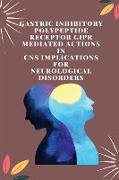- Start
- Gastric Inhibitory Polypeptide Receptor GIPR Mediated Actions in CNS Implications for Neurological disorders
Gastric Inhibitory Polypeptide Receptor GIPR Mediated Actions in CNS Implications for Neurological disorders
Angebote / Angebote:
Gut hormones, glucose-dependent insulinotropic polypeptide (GIP), also known as gastric inhibitory polypeptide, and glucagon-like peptide-1 (GLP-1), regulate meal-induced glucose homeostasis and endocrine secretions [1]. Incretin mimetics are an established class of therapeutics at present for the treatment of NIDDM [2]. Incretins are known to exert pleiotropic actions in extra-pancreatic tissues, and influence the gut-brain axis through both direct and indirect mechanisms [3]. Incretin hormones like GLP-1, GIP exhibit conservation across species and act through dedicated class B GPCRs [4]. Synthesis of incretin hormones like GLP-1 and GIP is reported in both central and peripheral nervous systems [5]. Neurodegenerative disorders like Alzheimer's and Parkinson's disease have huge unmet medical needs, societal costs and no therapeutics exists which can slow down or reverse the disease progression [6]. Current therapeutics are predominantly oriented towards providing symptomatic benefits, without significantly addressing the underlying pathology. Investigational therapeutics for exploring disease modification comprise of considerable proportion of the current pipeline in neurodegenerative conditions [7].
Most disease-modifying approaches under clinical and preclinical investigation are based on the proteinopathy theory, addressing the aggregation of misfolded proteins in brain [8]. So far, development of these approaches, e.g., monoclonal antibodies targeting A¿ and BACE inhibitors have met with limited success clinically, highlighting urgent need for development of novel therapeutics [9]. Amongst other, neurotrophins show potential anti-apoptotic and pro-survival responses in neurodegenerative disease, however applications have been limited due to lack of brain penetration and delivery issues [10]. Multi-targeted drug ligands (MTDLs) combining symptomatic benefits and disease-modification by acting at multiple signaling pathways are being envisaged for addressing the complexity associated with neurodegenerative disease.
Folgt in ca. 15 Arbeitstagen


